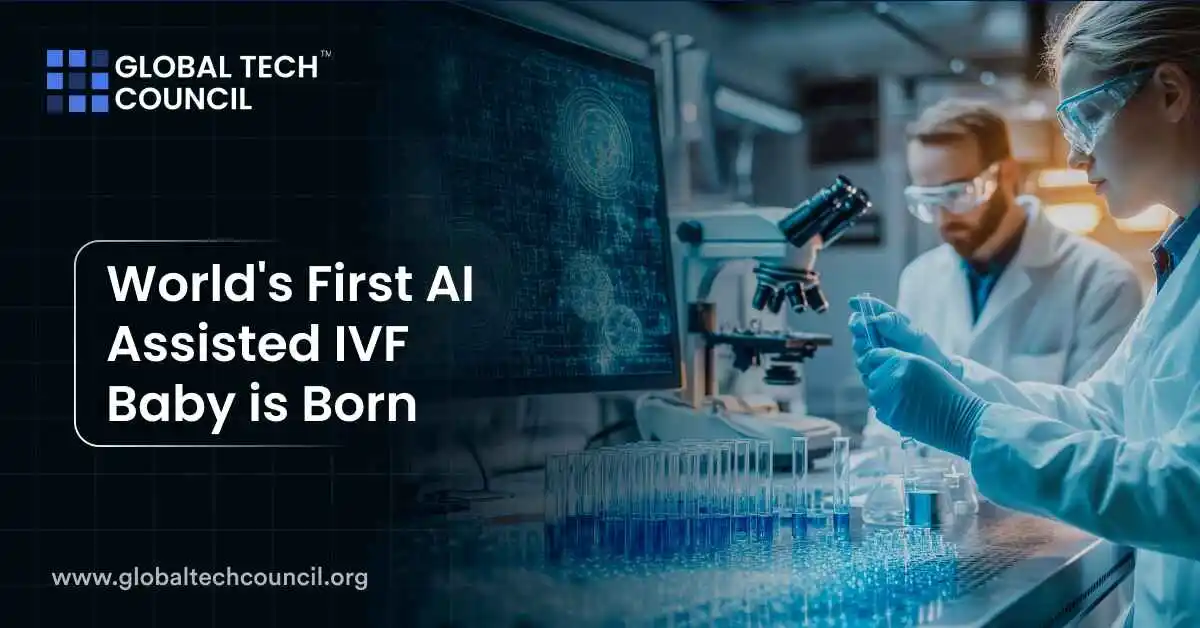
The world’s first baby born through AI-assisted IVF is making headlines—and history. In April 2025, a healthy baby boy was delivered in New Zealand, conceived using an artificial intelligence system that selected and fertilized embryos with little human intervention. This moment marks a major step in fertility treatment, blending robotics, machine learning, and reproductive medicine.
The AI was developed by Australian tech startup Life Whisperer (a subsidiary of Presagen) and used advanced algorithms to analyze embryos and predict which had the highest chance of success.
What Is AI-Assisted IVF?
AI-assisted IVF (in vitro fertilization) uses artificial intelligence to support or fully automate parts of the reproductive process. In this case, AI didn’t just analyze embryo images—it helped select, fertilize, and monitor them.
The system handled 23 steps of the fertilization process, including sperm selection and injection into the egg using robotic arms. Embryologists still monitored the process, but the AI made the decisions and controlled the tools.
How the AI Process Worked
The couple who underwent this procedure had five eggs extracted. AI selected and fertilized each one, resulting in four viable embryos. One embryo was implanted. Nine months later, the baby was born healthy and full-term.
This system increased embryo selection accuracy and reduced manual steps. It also meant less variability and less chance of human error.
Benefits of AI in Fertility
AI brings accuracy, efficiency, and consistency. It can analyze thousands of embryo images, learn patterns linked to success, and rank embryos better than the human eye.
It’s also much faster and can reduce the overall cost of IVF, which remains out of reach for many people today.
Traditional IVF vs. AI-Assisted IVF
| Feature | Traditional IVF | AI-Assisted IVF |
| Sperm and embryo selection | Done by embryologist | Handled by AI algorithm |
| Fertilization process | Manual (ICSI) | Automated with robotics |
| Error margin | Higher | Lower |
| Time efficiency | Moderate | Faster |
| Cost (long-term) | Higher | Potentially lower |
How Is This Different From Past AI Use in IVF?
Until now, AI in IVF was limited to recommending embryo selection based on images. Human embryologists still made final decisions. This case is different.
Here, AI performed every step from start to finish, including embryo scoring, sperm injection, and monitoring. Humans supervised but didn’t interfere.
Who Developed the Technology?
The AI system was created by Conceivable Life Sciences, a US-based company focused on reproductive automation. Their robotic ICSI (intracytoplasmic sperm injection) system is being tested globally.
They claim their tech increases success rates by over 25% and reduces the number of IVF rounds needed to conceive.
Benefits of AI in Reproductive Medicine
| Area of Impact | AI Contribution |
| Embryo selection | High-accuracy visual assessment |
| Genetic screening | Identifies healthiest embryos |
| Fertilization | Robotic sperm injection |
| Data-driven insights | Personalized IVF plans |
| Cost and time savings | Shorter IVF cycles |
Are There Risks or Limitations?
Yes. While this success is huge, experts say it’s too early to replace human supervision. AI models can still misinterpret data, especially in medical settings. Also, ethical debates are ongoing:
- Should AI decide who gets to be born?
- How do we regulate private companies building such tech?
- Will insurance cover AI-driven fertility?
These questions will become more urgent as AI tools expand into more hospitals and labs.
What Does This Mean for the Future of IVF?
This birth could spark a major shift in how we approach infertility. As AI tools improve, fertility treatments could become more affordable, accessible, and successful. Clinics may one day offer fully automated IVF as a standard option.
Already, clinics in the U.S., Australia, and parts of Europe are trialing similar tech. If proven safe and scalable, AI-assisted IVF could dramatically improve success rates and reduce emotional and financial stress for millions.
Who Should Care?
- Couples facing infertility
- IVF clinics and embryologists
- Researchers in AI and health tech
- Policymakers regulating assisted reproduction
And anyone curious about how AI is beginning to touch the most human parts of life.
Conclusion
If you’re passionate about the role of technology in medicine, consider a Data Science Certification to learn how models like these are built and used.
To understand the business impact of health tech and medical marketing, check out the Marketing and Business Certification. And for broader exposure to next-gen technologies, explore the Deep Tech Certification.